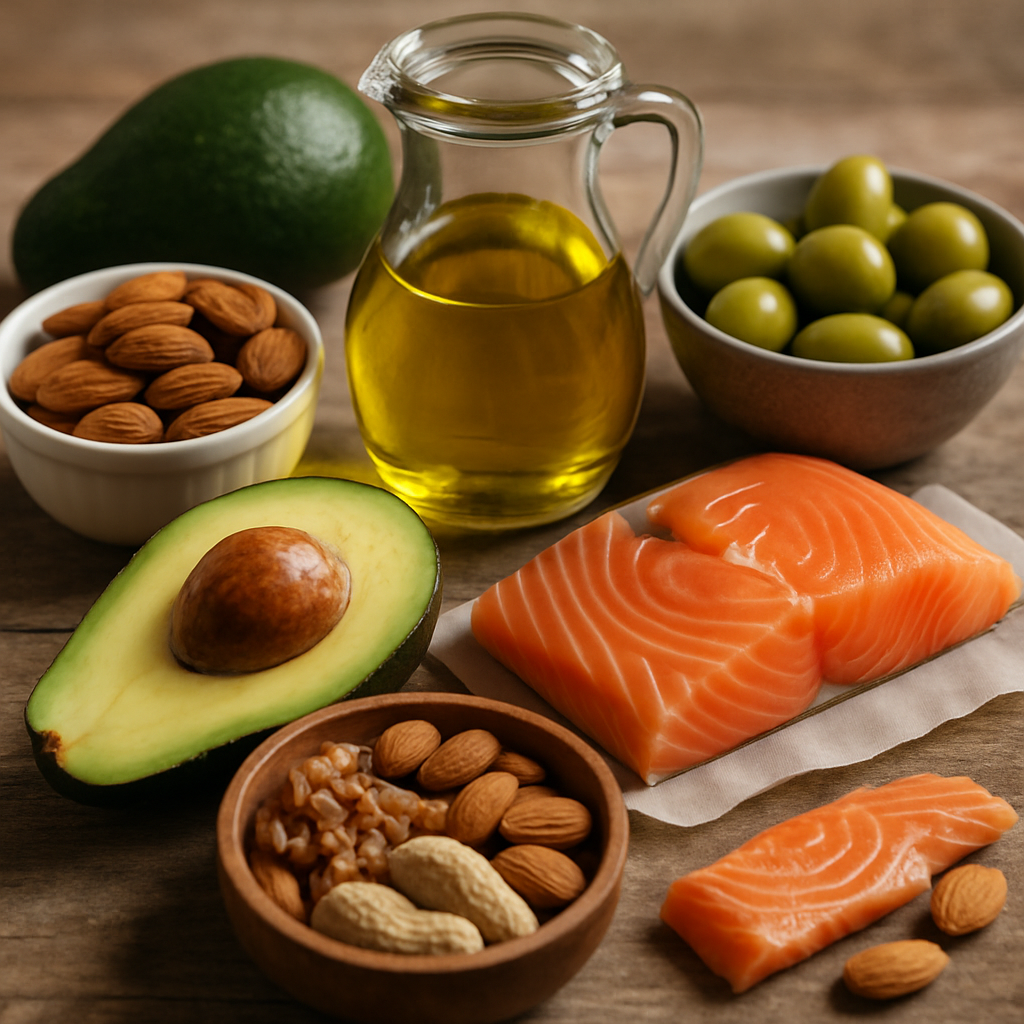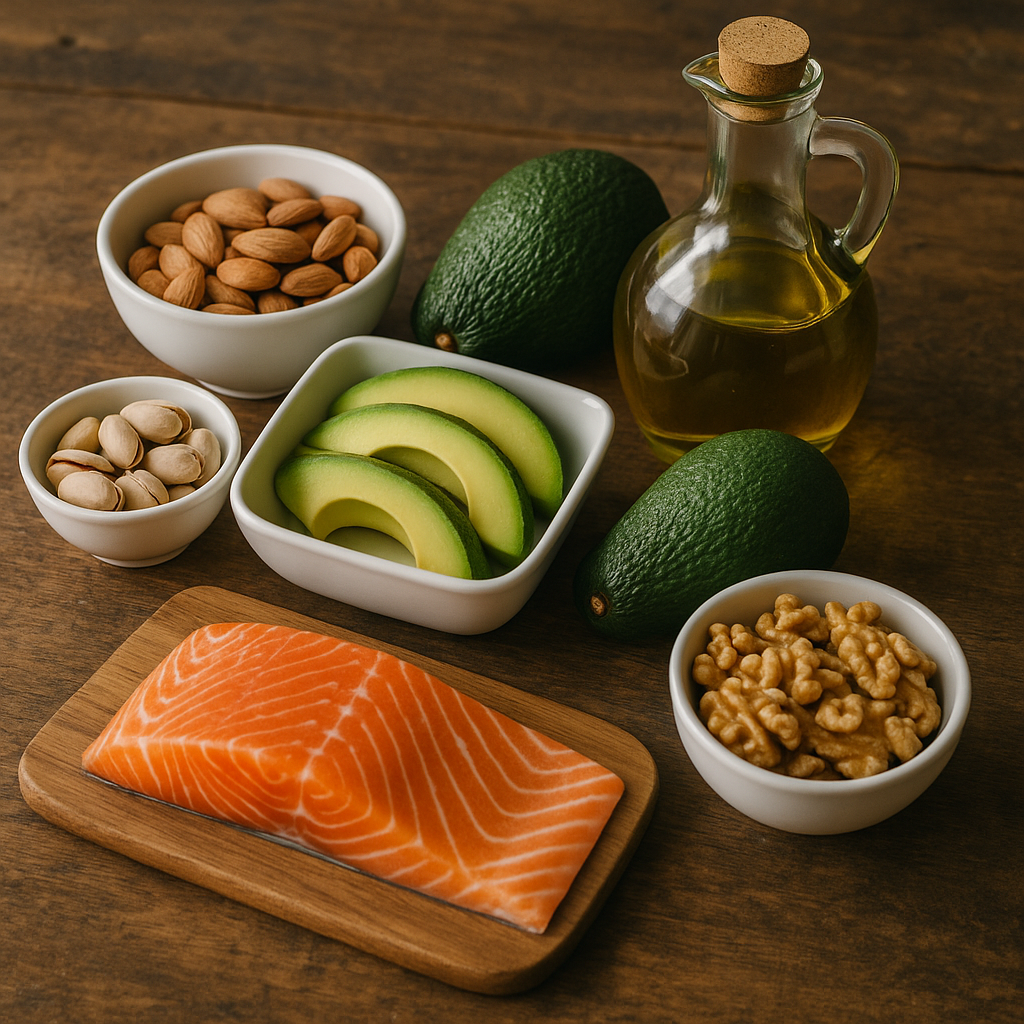Ask Ayurvedic doctor a question and get a consultation online on the problem of your concern in a free or paid mode. More than 2,000 experienced doctors work and wait for your questions on our site and help users to solve their health problems every day.
What Are Healthy Fats: Types, Benefits, and Food Sources

Ever wondered, what are healthy fats and why they matter? You're not alone. Despite years of being told to avoid fat like the plague, modern nutrition has turned the tables. Healthy fats are not just okay—they're essential. They help with brain function, energy production, skin health, and hormone regulation. Yet, there’s still a lot of confusion out there.
In this guide, we’ll break down the types of healthy fats, how they compare to unhealthy ones, and which healthy fats foods to include in your everyday meals. If you’ve ever found yourself googling a healthy fats list or trying to understand sources of healthy fats, you’re in the right place. We’ll also look at insights from Ayurveda to see how ancient wisdom aligns with modern science.
So, let’s dive in—because your body (and maybe even your brain) is literally made from fat. No kidding.

What Are Healthy Fats and Why Do We Need Them?
Healthy fats are types of dietary fats that promote well-being rather than contribute to health problems. They mostly come from plant-based oils, nuts, seeds, fish, and avocados. These fats help absorb essential vitamins (A, D, E, and K), maintain cell structure, and even boost mood.
They’re typically unsaturated fats, which are categorized into two types: monounsaturated fats (MUFAs) and polyunsaturated fats (PUFAs). These are the "good guys" your body actually craves. In contrast, trans fats and excessive saturated fats—like those in fried foods and processed snacks—can increase the risk of heart disease.
But here's the twist: Not all saturated fats are evil. Ghee and coconut oil, which we’ll talk about more in the Ayurveda section, can actually be beneficial in moderation.
Healthy Fat Percentage for Daily Nutrition
You don’t need to count grams obsessively, but knowing the rough range helps. Around 25-35% of your daily calories should come from fat, with the bulk being healthy fat sources. That means for a 2,000-calorie diet, around 500-700 calories (or 55-75 grams) can come from fat.
Still, balance is key. Too little fat can mess with your hormones, energy levels, and even your ability to think straight.
Difference Between Healthy and Unhealthy Fats
Here’s a quick snapshot to clear the fog:
-
Healthy fats: Found in olive oil, avocado, nuts, seeds, and fatty fish. They support heart health, reduce inflammation, and are part of a balanced diet.
-
Unhealthy fats: Like trans fats (think margarine and baked goods) and some saturated fats in processed meats, they increase LDL ("bad") cholesterol and the risk of cardiovascular disease.
And just to throw a wrench in things, some natural saturated fats—like in dairy or dark chocolate—aren’t so bad when eaten in moderation. The devil is in the dose, right?
Don't wait or self medicate. Start chat with Doctor NOW
Healthy Fats List and Their Benefits in Ayurveda
Ayurveda, the traditional Indian system of medicine, has long emphasized the value of healthy fats. According to this ancient practice, fats aren't just fuel—they’re deeply nourishing for the body and mind.
Best Healthy Fats to Eat for Energy and Digestion
In Ayurveda, fats play a vital role in agni, or digestive fire. Consuming the right kinds of fat helps keep your digestion strong and steady. Here are a few healthy fats to eat that align with both Ayurvedic and modern nutritional science:
-
Ghee: Clarified butter that supports digestion and brain function. It’s also considered sattvic, or pure, in Ayurveda.
-
Coconut oil: Rich in medium-chain triglycerides (MCTs) that are easy to digest and provide quick energy.
-
Avocados: Cooling, nourishing, and high in monounsaturated fats—great for calming vata dosha.
-
Nuts and seeds: Almonds, walnuts, flaxseeds, and chia seeds offer fiber and omega-3 fatty acids.
These aren’t just calorie bombs; they’re tools to support your well-being—physically and mentally.

Healthy Fats Food and Natural Sources
Alright—so we’ve covered the “why.” Now let’s talk about the “what.” You might be wondering where to find these healthy fats foods without falling into the rabbit hole of expensive supplements or mystery seed oils. Good news: a lot of them are already in your pantry—or they should be.
Eating whole food sources of healthy fat is one of the easiest ways to stay on track without stressing about labels. Think real, recognizable ingredients.
Whole Food Sources of Healthy Fat
Here's a quick breakdown of some top-tier healthy fat sources that are both practical and nutrient-dense:
-
Avocados – Creamy, delicious, and absolutely loaded with monounsaturated fat. Add them to toast, smoothies, or eat 'em straight with a pinch of sea salt.
-
Fatty fish – Salmon, sardines, mackerel, and trout are excellent healthy fat foods, rich in omega-3s that support heart and brain function.
-
Olives and olive oil – One of the oldest healthy fat sources known to humankind. A cornerstone of the Mediterranean diet for good reason.
-
Nuts – Almonds, cashews, macadamias, and pistachios are great for snacking or adding crunch to salads and oatmeal.
-
Seeds – Flaxseeds, chia seeds, pumpkin seeds, and sunflower seeds are small but mighty. They pack both fats and fiber.
-
Eggs – Often wrongly demonized, eggs (especially the yolks) are actually a fantastic healthy fat food. Plus, they come with protein and vitamins like B12 and D.
Quick side note—some people avoid whole-fat dairy like the plague. But in moderation, things like Greek yogurt or full-fat cheese can be part of a healthy diet, too. Don't toss the baby with the bathwater, ya know?
How to Incorporate Healthy Fats in Daily Meals
Okay, you’ve got the list. But how do you use it without turning your kitchen into a chemistry lab?
Here are a few easy, totally non-intimidating ways to get more healthy fats to eat into your daily routine:
-
Drizzle olive oil on cooked veggies or over salad (and don’t be shy—go generous)
-
Add nut butter to smoothies, toast, or even oatmeal
-
Throw avocado into breakfast wraps, burrito bowls, or even desserts (yes, avocado mousse is a thing)
-
Cook with ghee or coconut oil instead of generic vegetable oil—they both have high smoke points and add flavor
-
Top dishes with a handful of nuts or seeds. It takes 3 seconds but adds crunch and nutrition.
One thing to keep in mind is balance. You don't want to eat three tablespoons of peanut butter and call it a day. Combine healthy fats with fiber and protein to help stabilize blood sugar and keep you fuller longer.
Oh—and don’t stress about being perfect. Some days you’ll overdo it on almond butter, some days you’ll forget to eat any fat at all. It’s fine. Really.
Conclusion
Healthy fats aren’t just a “trend” or some weird fitness guru obsession—they’re essential. Whether you’re boosting your energy, supporting digestion, or just trying to build a better relationship with food, knowing your healthy fats list is a huge step.
By understanding the difference between good and bad fats, and learning how to incorporate the best sources of healthy fats into your meals, you’re already ahead of the curve. Mix modern nutrition with some ancient wisdom (looking at you, Ayurveda), and you’ll find that food doesn’t just feed the body—it can heal it, too.
So next time you ask yourself, what are healthy fats and why do they matter? Just look at your next meal.
FAQs
What are the healthiest fats to eat?
This is probably one of the most common questions—and a great one.
The healthiest fats to eat generally come from whole, unprocessed sources. Top of the list?
-
Avocados – full of monounsaturated fats that support heart and brain health.
-
Salmon and sardines – rich in omega-3 fatty acids, which reduce inflammation and protect your heart.
-
Nuts and seeds – almonds, chia seeds, walnuts, and flax are all powerful little fat bombs (in a good way).
-
Extra virgin olive oil – anti-inflammatory and full of antioxidants.
-
Ghee and coconut oil – especially when used in cooking, these offer traditional flavor and healthy saturated fat in moderation.
It’s not just about eating fat—it’s about eating the right kinds of fat. Choose options from your healthy fats list and rotate them to keep things interesting. Nobody wants to eat the same thing forever, right?
Can healthy fats improve skin and brain function?
Oh heck yes.
Consuming the right healthy fats food can support skin hydration, elasticity, and even help with conditions like eczema. Omega-3 fatty acids in particular are known for their skin-healing properties. They can reduce inflammation and protect the skin barrier.
And for the brain? Let’s just say your noggin loves fat. The human brain is nearly 60% fat, and getting enough of the right fats—especially omega-3s—can improve cognitive function, memory, and even mood. If you’ve ever felt foggy or irritable on a low-fat diet, that’s probably why. Your brain was starving, literally.
Call to Action: Start Small, Think Big
Alright. You now know what are healthy fats, why they matter, and how to get them into your life without turning into a nutrition robot.
Here’s your challenge: Start with one change this week.
Maybe it’s switching your cooking oil from vegetable oil to ghee or olive oil. Or maybe it’s adding a few slices of avocado to your lunch. Whatever it is, let it be simple. Let it be doable.
You don’t have to overhaul your entire diet overnight. This isn’t a boot camp. It’s a conversation between you and your body. One that says: “Hey, I care. I’m listening.”
Bookmark this article. Share it with your friend who still thinks fat = evil. Heck, print it out and stick it to the fridge.
Remember: Healthy fats aren't just something to “fit in” to your diet—they’re the foundation of real, lasting health.
And honestly? They're delicious too. So enjoy 'em.
Thanks for reading. If you found this helpful, feel free to share it with someone who needs to hear that not all fats are bad. The more we understand food, the more empowered we become to make better choices.
💬 Got a question about fats or nutrition in general? Drop a comment or reach out—we love nerding out about this stuff.

